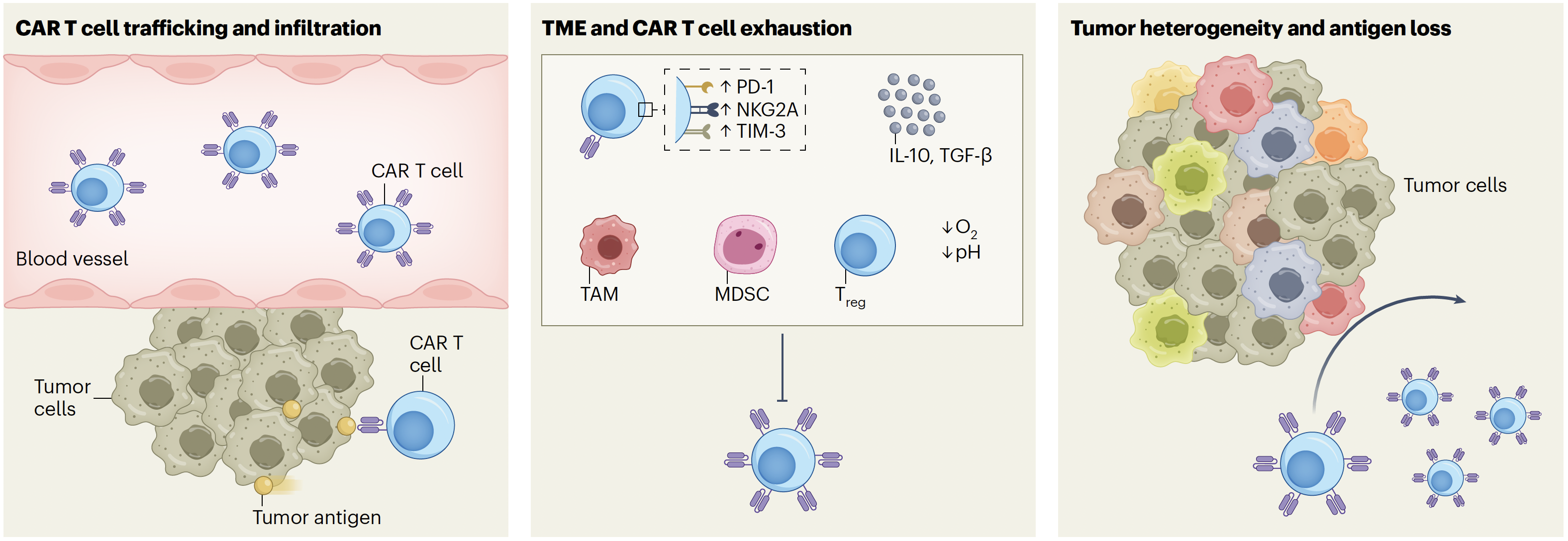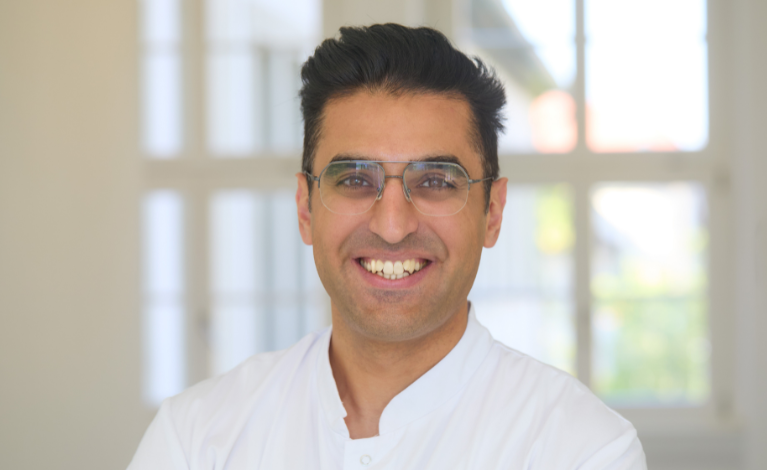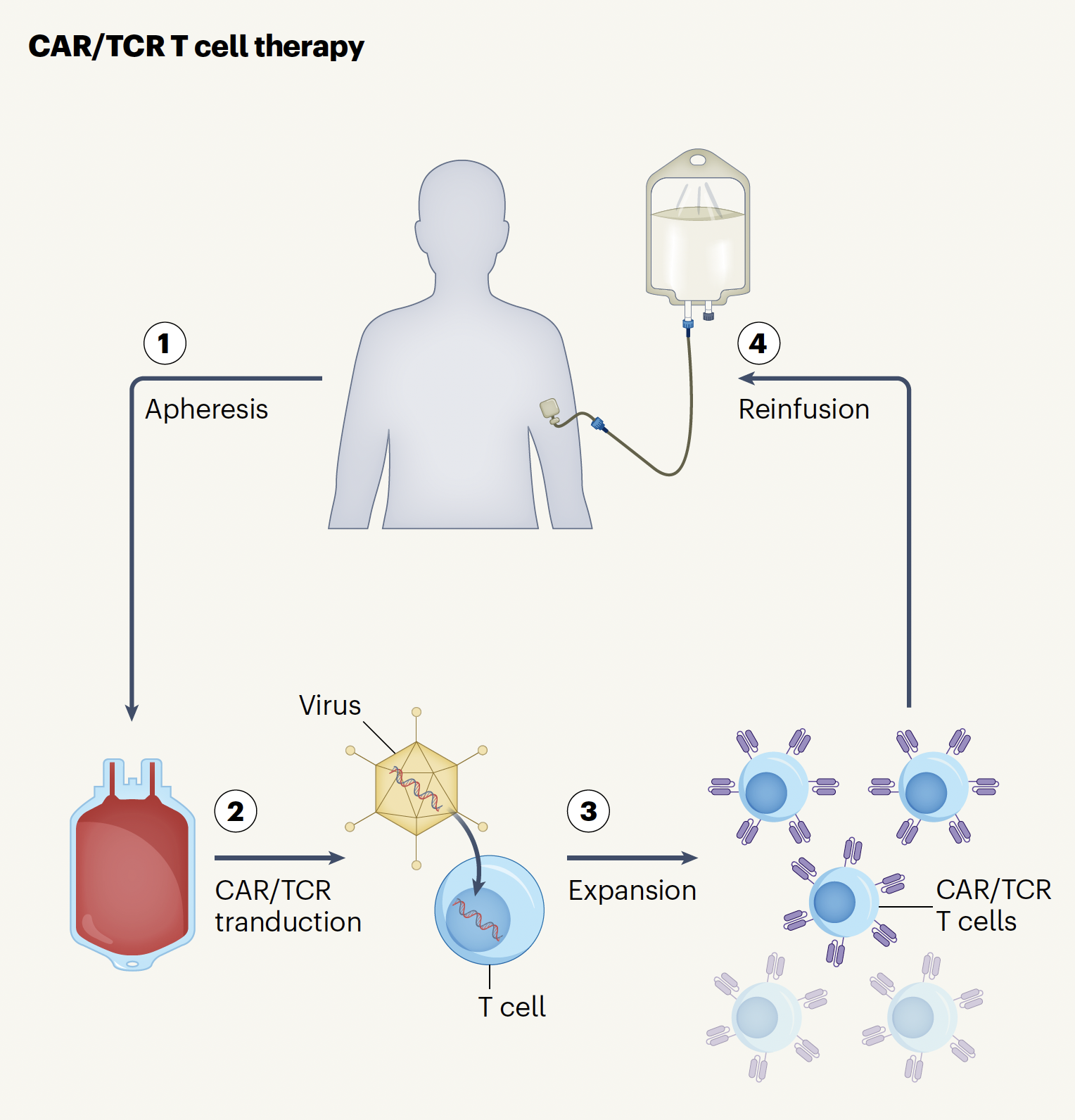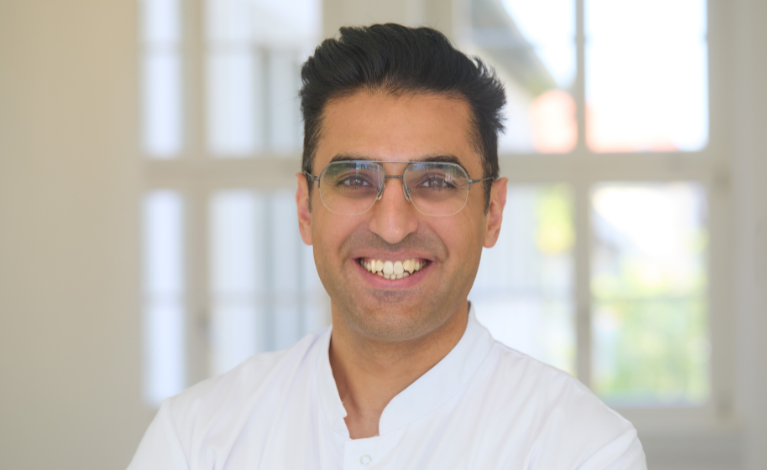Translational Cellular Therapies
The Uslu Laboratory (AG Uslu)
We are building a dynamic, international, and collaborative team at the Department of Dermatology, University Hospital Würzburg. Together, we push the boundaries of science to make cellular immunotherapy work where it is needed most: solid tumors with a focus on dermatological malignancies.
What is CAR/TCR T Cell Therapy?
CAR (Chimeric Antigen Receptor) and TCR (T Cell Receptor) T cell therapies represent one of the most exciting breakthroughs in modern medicine. In this approach, a patient’s own T cells are collected, genetically engineered to express a CAR/TCR, expanded, and reinfused to seek and destroy tumor cells (Fig. 1).
Especially CAR T cell therapies have already revolutionized the treatment of leukemias and lymphomas and have shown first successes in severe autoimmune diseases - and now the race is on to bring this success to solid tumors.
Challenges in Solid Tumors
Despite approval in hematological malignancies, solid tumors remain a challenge. Why?
- Engineered T cells struggle to expand, reach and infiltrate dense tumor tissue.
- The solid tumor microenvironment suppresses T cell function, leading to engineered cell exhaustion.
- Tumors can escape immune recognition through heterogeneity and antigen loss.
These barriers explain why the next great leap in immunotherapy will come from scientists who can overcome these hurdles.

Our Solutions and Research Focus
This is where the Uslu laboratory takes action. We focus on developing CAR T cell combination therapies and designing next-generation engineered immune cells that go beyond the current state of the art. By combining advanced engineering strategies with rational therapeutic partnerships, we aim to create cellular products that are stronger and more durable. Our core approaches include:
- Next-generation CAR T cell design that deliver targeted payloads, boost local immune responses, and overcome resistance mechanisms.
- Multi-CAR-targeting to overcome tumor heterogeneity and prevent antigen escape.
- Integrating CAR T cells with other drugs to achieve synergistic efficacy.
“Our ultimate goal is nothing less than to unlock the full potential of cellular therapies for patients with solid tumors – turning scientific innovation into real clinical breakthroughs.”
Principal Investigator

Ugur Uslu studied medicine at the University of Tübingen, where he also completed his doctoral thesis. He obtained his board certification in dermatology as well as his habilitation at the Friedrich-Alexander University Erlangen-Nürnberg. This was followed by a five-year research fellowship at the University of Pennsylvania in Philadelphia (USA) in the renowned laboratory of CAR T cell therapy pioneer Carl H. June.
Since October 2025, Ugur Uslu has been Professor of Dermatological Oncology at the University Hospital Würzburg. His research focuses on the development and translation of innovative CAR T cell therapies for solid tumors, with a particular emphasis on dermatological malignancies.
Team members
Dr. Ebrahem Hamed, PhD
Postdoctoral Researcher
Claudia Siedel
Lab manager
Marion Berthold
Staff scientist
Thamer Al Hamad, MSc
Staff scientist
Selected publications
Castelli S, Wilson W, Uslu U, Finck A, Assenmacher CA, Atoche SJ, Siurala M, Young RM, June CH. IL-9 signaling redirects CAR T cell fate toward CD8+ memory and CD4+ cycling states, enhancing anti-tumor efficacy. Immunity 2025, in press.
Uslu U, June CH. Beyond the blood: Expanding CAR T cell therapy to solid tumors. Nature Biotechnology 2025; 43(4):506-515.
Uslu U, Castelli S, June CH. CAR T cell combination therapies to treat cancer. Cancer Cell 2024; 42(8):1319-1325.
Amit U*, Uslu U*, Verginadis II*, Kim MM, Motlagh SAO, Diffenderfer ES, Assenmacher CA, Bicher S, Atoche SJ, Ben-Josef E, Young RM, June CH, Koumenis C. Proton radiation boosts efficacy of mesothelin-targeting chimeric antigen receptor T cell therapy in pancreatic cancer. PNAS 2024; 121(31):e2403002121. *shared first authors
Uslu U, Sun L, Castelli S, Finck AV, Assenmacher CA, Young RM, Chen ZJ, June CH. The STING agonist IMSA101 enhances chimeric antigen receptor T cell function by inducing IL-18 secretion. Nature Communications 2024; 15(1):3933.
Uslu U, Da T, Assenmacher CA, Scholler J, Young RM, Tchou J, June CH. Chimeric antigen receptor T cells as adjuvant therapy for unresectable adenocarcinoma. Science Advances 2023; 9: eade2526.
Uslu U, June CH. T-cell therapies targeting multiple cancer antigens: The power of many. Cancer Immunology Research 2023; 11(7):865.
Uslu U, June CH. CAR T-cell therapy meets clonal hematopoiesis. Blood Cancer Discovery 2022; 3(5):382-384.
Young RM, Engel NW, Uslu U, Wellhausen N, June CH. Next-generation CAR T-cell therapies. Cancer Discovery 2022; 12(7):1625-1633.
Press releases and media appearances
Contact
Appointment Policlinic
+49 931 201-26714
Monday to Thursday
12:00 PM to 16:00 PM
Friday
12:00 PM to 15:00 PM
Appointment In-patient care
Monday to Friday
08:00 AM to 12:00 PM
Margit Körner
+49 931 201-26354
Telephone
Gate
+49 931 201-26710
Directorate
Prof. Dr. med. Matthias Goebeler
Secretary's office
Gudrun Braun
+49 931 201-26351
Student matters
Ute Düchs
+49 931 201-26353
Address
Klinik und Poliklinik für Dermatologie, Venerologie und Allergologie | Josef-Schneider-Straße 2 | Haus D8 | 97080 Würzburg | Deutschland


